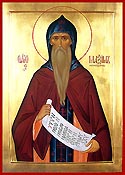|
|||
|---|---|---|---|
| This weekly bulletin insert complements the curriculum published by the Department of Christian Education of the Orthodox Church in America. This and many other Christian Education resources are available at http://dce.oca.org. | |||

In I Peter 4: 12-13 we read: "Beloved, do not be surprised at the fiery ordeal that is taking place among you to test you, as though something strange were happening to you. But rejoice insofar as you are sharing Christ's sufferings, so that you may also be glad and shout for joy when His glory is revealed." Peter here reminds us that if we are to share life forever with Christ, we must expect that first we will be tested in this world that rejects Him. Peter goes on, "If you are reviled for the name of Christ, you are blessed, because the spirit of glory, which is the Spirit of God, is resting on you." The Church honors two Christians who lived centuries later than Peter, and who underwent their own "fiery ordeals" and tests of faith. The first, Saint Agnes, was a Roman maiden born to a Christian family in the late third century, when the Christian-hating Diocletian reigned as emperor. Agnes refused to marry a pagan and give up her faith, and so at a very young age she was brutally tortured and finally died. Her story is similar to those of other female martyrs. Maximus the Confessor, who lived in seventh-century Constantinople, had a brief career in public service, and then chose to enter a monastery. Political upheaval forced him to flee to Carthage, where he became embroiled in a controversy about the divine and human wills of Jesus Christ. He insisted that Christ had two wills, and not just His divine will, as some were asserting. Without a human will, Maximus said, Christ could not be truly human. In the year 658, Maximus' position endangered him. The Patriarch of Constantinople accepted the one-will teaching, and the Emperor had been persuaded to do the same. Maximus was exiled as a heretic. Four years later his tongue was cut out and his hand was cut off so that he could no longer speak or write his "false" teachings. He died a few years later.
The Sixth Ecumenical Council, convened in 680, declared that Christ being perfect God and perfect Man did have both a divine will and a human will. All charges against Maximus were posthumously dropped. He would become a saint of both the Eastern and Western Churches. To be misunderstood, as Maximus was, is a painful human experience that many of us may share, though not at so great a price as the one he paid. Or we may find ourselves in a hostile environment, as Agnes did, though it may not take our life as it took hers. We will have our own ordeals, and they'll seem fiery enough. It will be hard, when we are going through them, to believe that one day we will "shout for joy." Perhaps it was hard for Agnes and Maximus too, but now they stand ready to shout with us when the great day comes. |
|||

